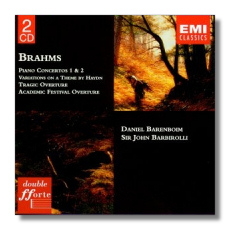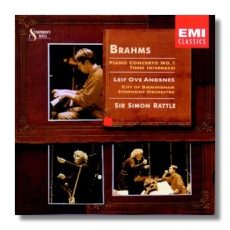
The Internet's Premier Classical Music Source
Related Links
- Brahms Reviews
- Latest Reviews
- More Reviews
-
By Composer
-
Collections
DVD & Blu-ray
Books
Concert Reviews
Articles/Interviews
Software
Audio
Search Amazon
Recommended Links
Site News
 CD Review
CD Review
Johannes Brahms

Piano Concertos
- Concerto for Piano #1 in D minor, Op. 15 (1859) *
- Concerto for Piano #2, Op. 83 (1881) *
- Overture "Tragic", Op. 81 (1880)
- Overture "Academic Festival", Op. 80 (1880)
- Variations on a Theme by Haydn, Op. 56a (1873)
Daniel Barenboim, piano
* New Philharmonia Orchestra/John Barbirolli
Vienna Philharmonic Orchestra/John Barbirolli
EMI Classics 72649 ADD 2CDs: 70:36, 76:09
Reissued on EMI 76939-2:
Amazon
- UK
- Germany
- Canada
- France
- Japan
- ArkivMusic
- CD Universe
- JPC


- Concerto for Piano #1 in D minor, Op. 15 (1859)
- 3 Intermezzos for Piano, Op. 117 (1892)
Leif Ove Andsnes, piano
City of Birmingham Symphony Orchestra/Simon Rattle
EMI Classics 56583 DDD 64:16
On disc, Norwegian pianist Andsnes has distinguished himself in everything from barnstorming concertos by Grieg and Rachmaninoff to intimate solo works by Janá_ek and Harald Saeverud. This Brahms piano concerto is one of the best things he's done, and I know of no other recording of this work from the past 15 to 20 years that reaches this level. Andsnes's first entrance, while quiet, immediately impresses with its precise articulation and singing tone. Later, where power is needed, Andsnes has it to spare, and the movement's more frightening technical challenges (a storm of octaves, for example) don't faze him, unlike some of his more famous forebears. The second movement is radiantly calm, and Andsnes finds poetry even in Brahms' awkward rhythmic constructions. Each reappearance of the Rondo theme brings new excitement, thanks to Andsnes's attention to phrasing. Rattle also deserves credit for the meticulousness of his phrasing, which is apparent right from the start of the concerto. He and his soloist are ideal partners, and the only thing that remains to be corrected is for the two of them to go on and record the second concerto! The City of Birmingham Symphony Orchestra is responsive and plays beautifully.
In the three Intermezzos, the more softly Andnes plays, the more we hear him. There are few short works more beguiling than the first of the three, and the pianist's ineffably tender touch pours balm on the listener and on the music.
The Barenboim/Barbirolli package costs about the same, but, as part of EMI Classics' "double fforte" series, it contains more than twice as much music. Although the recordings are 32 years old and remastered from analogue originals, no one need complain about the sound: it is warm, balanced, clear, and ingratiating.
As for the performances, they are even more astonishing than Andsnes's and Rattle's.The pairing of Barenboim and Barbirolli results in intensely Romantic Brahms; they play this music as if they are on a holy quest (which, in fact, they are). Even though slow tempos are the norm, the constant flowing and surging of passions charges the music, and I doubt that most listeners will be impatient or bored. Compared to Andsnes, Barenboim is less precise, less intentional in the way that he shapes a musical line, and arguably more "natural," although I admit the last point is extremely subjective. His technique is ample. Still, he doesn't make his part in the proceedings sound as easy as Andsnes does – a valid approach to this heroic music. If you believe that a feeling of challenge, struggle, and challenge overcome is essential to this music (and perhaps to music from the Romantic era in general), then Barenboim is your man.
And so is Barbirolli, for the same reasons. No orchestral phrase slips by without his careful scrutiny. I suppose that some listeners might find his conducting a little fussy, but I find his attention to musical ebb and flow sensitive, albeit masculine. In the purely orchestral works, he confirms his status as a major Brahmsian (although still an unhurried one). Fine as the New Philharmonia is, the Vienna Philharmonic outshines and "out-tones" them in the three orchestral works.
My advice: get both. You can never hear enough Brahms.
Copyright © 1999, Raymond Tuttle





















